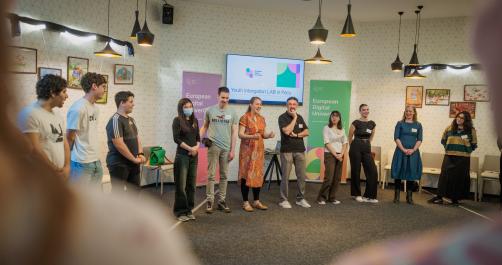
Overview of the Youth Integration Lab
The University of Pécs recently hosted the Youth Integration Lab, a three-day gathering that brought together young people from eight European universities and local Hungarian communities. The event, hosted by the European Digital UniverCity Alliance (EDUC), was not a typical academic conference. Instead of long lectures, it was a workshop‑style meeting where participants engaged in interactive games, painting exercises, and honest discussions about the barriers they face in education, employment and daily life.
Why Youth Participation Matters for Regional Development
Studies consistently show that involving young citizens in decision‑making processes yields solutions that are more practical and lasting. For the University of Pécs, the lab was an opportunity to identify how rural youth feel forgotten, how ethnic background can limit access to academic resources, and how short‑lived youth organisations still manage to create real impact.
Key Themes Explored
- Geographic disadvantages: rural youth and limited access to higher‑education resources.
- Social inequality: how class and ethnicity intersect to create educational gaps.
- Identity and belonging: the role of cultural background in shaping aspirations.
- Peer‑led leadership: the power of youth steering initiatives themselves.
- Cultural exchange: learning through shared creative activities.
Structure of the Three‑Day Event
Each day unfolded with a different focus that gradually built an interactive rhythm. Below is a concise recap of the sessions and how they contributed to a supportive learning environment.
Day 1 – Thursday: Warm‑Up and Storytelling
Participants began with a painting activity that encouraged them to “color outside the lines.” This was followed by short, personal presentations where students talked about their hometowns and the challenges they experience. The narrative format helped break initial tension and created space for shared empathy.
Day 2 – Friday: Deep Dives Into Structural Barriers
Friday’s session shifted to more analytical discussions. Peer‑led panels addressed rural participation gaps, while expert facilitators introduced the concept of digital inclusion. An excursion to a nearby small town, Pécsvárad, provided on‑the‑ground evidence of how far‑away communities can still thrive if they receive targeted support.
Day 3 – Saturday: Co‑Creation and Presentations
By Saturday, participants formed project teams that drafted concrete proposals to tackle specific disadvantages. These proposals were presented in a final showcase where stakeholders—including university staff, local policymakers and industry partners—were invited to discuss implementation steps. The closing ceremony was a testament to the group’s collective problem‑solving abilities.
Concrete Outcomes From the Lab
The lab produced more than just ideas; it catalyzed action plans that several universities are now taking forward. For example, a collaborative network was established to share best‑practice digital tools that facilitate inclusive learning environments. Another outcome is a mentorship scheme pairing university students with high‑school peers in rural areas to guide them through admission processes.
Follow‑Up Actions
- Creation of an online repository for best‑practice resources.
- Launch of a regional youth forum to maintain ongoing dialogue.
- Development of short-term, impact‑focused grants for youth‑led projects.
- Integration of alumni networks to provide career guidance.
Implications for International Students at the University of Pécs
International students are positioned within the same ecosystem and can benefit from the momentum created by the Youth Integration Lab. By engaging with local youth initiatives and the multidisciplinary teams at the university, they can broaden their cultural understanding and build valuable networks that often translate into career opportunities.
Practical Tips for Joining the Movement
- Attend the university’s Student Council meetings to propose new projects.
- Use the university’s Digital Hub to share content about your own community’s challenges.
- Volunteer for local NGOs that support youth in rural areas.
- Engage with faculty research projects on social inclusion – this can lead to collaboration and publications.
- Leverage the International Mentor Program for guidance on balancing academic work with extracurricular leadership.
How the University’s Programs Support Youth Empowerment
Several faculties across the University of Pécs offer courses and extracurricular activities that dovetail with the objectives highlighted in the Youth Integration Lab:
- Faculty of Social Sciences – courses on community development and participatory research.
- Faculty of Engineering and Information Technology – workshops on digital tools for inclusive education.
- Faculty of Cultural Sciences – seminars on intercultural communication strategies.
- Business and Economics Faculty – incubator programs for student‑led startups addressing social gaps.
Next Steps For You: Getting Involved at the University of Pécs
Whether you are an incoming student or already enrolled, the messages from the Youth Integration Lab are clear: active participation leads to tangible change. Consider the following to start making an impact today:
- Explore the university’s study programmes to find a track that aligns with social development interests.
- Submit a proposal to the Student Innovation Fund and secure funding for a project aimed at reducing educational barriers in your local community.
- Join the university’s online portal to access resources on inclusive pedagogy.
- Register for the next Youth Integration Forum that will be announced later in the year.
Call to Action: Your Role in Shaping the Future
The success of the Youth Integration Lab proves that collaborative action can address long‑standing social challenges. As a student or prospective student at the University of Pécs, you have an opportunity to leverage academic resources, professional networks, and a supportive community to drive sustainable change.
Ready to make a difference? Start by contacting the university’s International Office for guidance on getting involved with youth initiatives. Your voice and skills can be part of the solution the Youth Integration Lab envisioned.
Have questions about integrating into the local community, or wish to share your own experience with educational obstacles? Write to us and let’s start a conversation about how you can contribute.
Explore the University’s History and Vision for more insight into their commitment to inclusive growth and how you can be part of it.
We look forward to welcoming you to the University of Pécs and to the shared journey of empowering youth across Europe.

